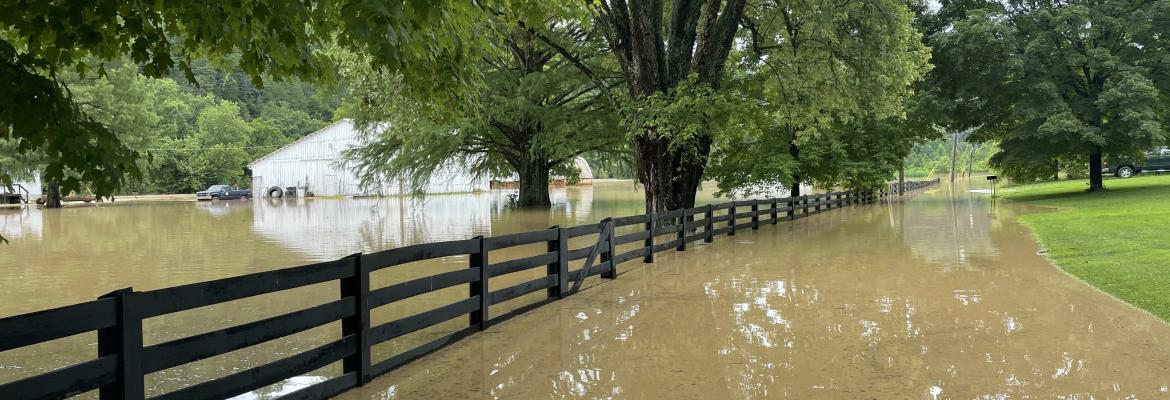Entrance of the Robinson Center for Appalachian Resource Sustainability (RCARS). Photo by Daniel Wilson.
Our hearts are with those impacted by the historic flooding in eastern Kentucky. We are checking on our staff and know that several have sustained losses. We are assessing damage at both RCARS and Robinson Forest and will continue to do so after the water recedes. Extension is mobilizing resources, and more information will be available soon on donations and volunteer clean-up efforts. We will be with the affected communities each step as they recover.
Get Involved
Letcher County needs help this week (August 8). Volunteers are needed Tuesday, Thursday, Friday and Saturday from 9 a.m. – 6 p.m. daily. Shad Baker (606-634-7799) will be your contact. You will connect with Shad at the Letcher Co. Central High School, 435 Cougar Dr., Whitesburg, KY 41858.
Hazard/Perry County volunteers are needed through August 14. If you are an out-of-area volunteer, you are responsible for finding your own housing at this time. We do not currently have the resources to support volunteer housing. Please bring your own water.
Where to Donate
- Donate to the university’s Basic Needs and Persistence Fund for students or our Crisis Program Gift Fund for faculty and staff.
- Kentucky Farm Bureau is relaunching its KFB for Kentucky Relief Fund to aid the families and communities affected by the devastating floods. To make a tax-deductible donation to this relief fund online, please visit www.kyfb.com/KFBforKYRelief, or checks may be mailed to Drew Graham, Executive Vice President, Kentucky Farm Bureau Federation, 9201 Bunsen Parkway, Louisville, KY 40220. Checks should be made payable to “Kentucky Farm Bureau Education Foundation” and denoted “KFB for Kentucky Relief Fund” on the memo line.
- Kentucky Department of Agriculture is accepting donations of bottled water, including individual bottles and gallon jugs, toiletries, and nonperishables through Friday, Aug. 5. Donations can be brought or mailed to: Kentucky Department of Agriculture, 105 Corporate Drive, Suite A, Frankfort, KY 40601. For questions about the KDA’s donation site, please call 502-573-0282.
- Governor Beshear has established the Team Eastern Kentucky Flood Relief Fund to assist those impacted by the floods and the severe weather system beginning July 26, 2022. All donations to the Team Eastern Kentucky Flood Relief Fund are tax-deductible, and donors will receive a receipt for tax purposes after donating. If you wish to donate to the Flood Relief Fund, please select an amount and click on the donate button below.
Resources for those Impacted
Personal and Environmental Safety
- 8 Tips to Clean up Mold
- Floods and Your Business
- Floods and Your Family
- Floods and Your Home
- Floods and Your Pets
- Mold and Mildew
- What to Wear Before Entering a Home or Building with Mold Damage (English) (Spanish)
- Flood Recovery Checklists for Farmsteads - North Dakota State University (2017)
- Floods and Organic Producers: Steps to Recovery after a Natural Disaster - Farmers' Legal Action Group, Inc. (2016)
- Proper Management of Flooded Grain and Hay - Iowa State Multiple Partnerships (2015)
- Floods (Articles, Fact Sheets, and Webinars) - Agrisafe
- Responding to Flooding on Farms - Agrisafe
- Flood Conditions and Your Septic System (2012)
- Timber Damage Guidance
- Replacing Important Papers in Kentucky
- Financial Recovery Following Natural Disaster
- Preventing Scams for Flood Victims
Open Burning
Do not burn mixed storm debris. Building materials can release hazardous contaminants and particulate matter when burned, and these can lead to additional health concerns.
Water Safety
Water contaminated with fuel, toxic chemicals, or radioactive materials will not be made safe by boiling or disinfection.
Food Safety
Keep Food Safe After a Disaster or Emergency (CDC)
Mental Health
- Farm Stress and Rural Mental Health Resources
- Kentucky Service Provider Directory
- Community Mental Health Centers, Crisis Lines, and Psychiatric Hospitals
- Mental Health Support for UK Employees
Livestock Mortality Management
On-site composting or burial are likely the best options for disposal of livestock mortalities.
For assistance with mass burial of livestock, contact local NRCS field office. They can assist with siting in appropriate soils to prevent groundwater contamination.

